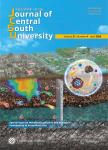A novel Lagrangian relaxation level approach for scheduling steelmaking-refining-continuous casting production
A novel Lagrangian relaxation level approach for scheduling steelmaking-refining-continuous casting production作者机构:State Key Laboratory of Digital Manufacturing Equipment and Technology (Huazhong University of Science and Technology) Wuhan 430074 China School of Automation Shenyang Institute of Engineering Shenyang 110136 China State Key Laboratory of Synthetical Automation for Process Industries (Northeastern University) Shenyang 110819 China
出 版 物:《Journal of Central South University》 (中南大学学报(英文版))
年 卷 期:2017年第24卷第2期
页 面:467-477页
核心收录:
学科分类:080602[工学-钢铁冶金] 08[工学] 0806[工学-冶金工程]
基 金:Projects(51435009,51575212,61573249,61371200)supported by the National Natural Science Foundation of China Projects(2015T80798,2014M552040,2014M561250,2015M571328)supported by Postdoctoral Science Foundation of China Project(L2015372)supported by Liaoning Province Education Administration,China
主 题:steelmaking-refining-continuous casting Lagrangian relaxation(LR) approximate subgradient optimization
摘 要:A Lagrangian relaxation(LR) approach was presented which is with machine capacity relaxation and operation precedence relaxation for solving a flexible job shop(FJS) scheduling problem from the steelmaking-refining-continuous casting process. Unlike the full optimization of LR problems in traditional LR approaches, the machine capacity relaxation is optimized asymptotically, while the precedence relaxation is optimized approximately due to the NP-hard nature of its LR problem. Because the standard subgradient algorithm(SSA) cannot solve the Lagrangian dual(LD) problem within the partial optimization of LR problem, an effective deflected-conditional approximate subgradient level algorithm(DCASLA) was developed, named as Lagrangian relaxation level approach. The efficiency of the DCASLA is enhanced by a deflected-conditional epsilon-subgradient to weaken the possible zigzagging phenomena. Computational results and comparisons show that the proposed methods improve significantly the efficiency of the LR approach and the DCASLA adopting capacity relaxation strategy performs best among eight methods in terms of solution quality and running time.



